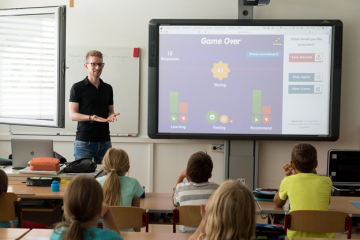 We all know that parent-teacher communication is important. After all, in the ideal scenario, you and your child’s teacher will be partnering together throughout the year to help your child achieve his full potential. So, how do you ensure that the line of communication between you and your kid’s teacher is a clear and open one? Consider the following Dos and Don’ts.
We all know that parent-teacher communication is important. After all, in the ideal scenario, you and your child’s teacher will be partnering together throughout the year to help your child achieve his full potential. So, how do you ensure that the line of communication between you and your kid’s teacher is a clear and open one? Consider the following Dos and Don’ts.
Do Make the First Move
Approach your child’s teacher at the beginning of the year, and let her know that you want to play an active role in your child’s education. Tell her that she can call or email you anytime, whether it’s to discuss your child’s progress or ask for assistance in the classroom. Taking this first step will make a positive impression and open up the door for future communications.
Do Email Teachers
Most teachers today much prefer an email to a telephone call. It’s just so much easier to send an email from their desks rather than walk to the office to return a call. Plus, with email, you have a record of all past conversations, which is immensely helpful when you’re dealing with the parents of dozens of different kids. When in doubt, ask the teacher directly how she prefers to be contacted.
Do Pay Compliments
Have you ever gotten a call from a teacher about your child’s good behavior? It’s always a nice surprise for parents, but the same is true for teachers. When parents contact them, it’s usually about a problem. If you’re loving something your child’s teacher is doing in class, let her know!
Don’t Wait for a Phone Call
If your maternal (or paternal) instincts tell you that something is up with your little one, don’t make the mistake of waiting for the teacher to point it out. Remember, the teacher has a classroom full of twenty or more kids to look after each day, and she’s only human. Even if she is aware of a problem, it may get put on the back burner if she has more pressing issues to deal with. Remember the squeaky wheel analogy, and speak up.
Don’t Blame the Teacher
Even if you disagree with a teacher’s instructional methods, it’s never a good idea to resort to attack mode. Not only is it rude, but it could likely impact the relationship between your child and the teacher. If you have a legitimate concern and don’t feel like you can voice it civilly to your child’s teacher, then speak with the principal instead. A conference with a neutral party may be in order.
Parent-teacher communication can sometimes be difficult, but making the effort to communicate frequently will pay off for your child in the long-term. How often do you communicate with your kid’s teacher?


